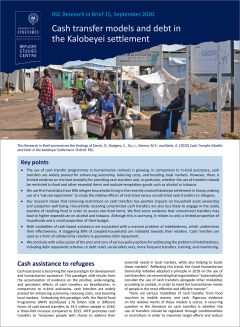Cash transfer models and debt in the Kalobeyei settlement
Olivier Sterck, Cory Rodgers, Jade Siu, Maria Flinder Stierna, Alexander Betts

This research brief from the Refugee Economies Programme focuses on the use of cash transfers in the Kalobeyei settlement in Kenya. It summarises the findings of a report by the same name published in August 2020. The use of cash transfer programmes in humanitarian contexts is growing. In comparison to in-kind assistance, cash transfers are widely praised for enhancing autonomy, reducing costs, and boosting local markets. There are various kinds of cash transfer, from food vouchers to mobile money, and cash. Yet, evidence on the relative merits of these different models is scarce. Using first-hand data from 896 refugee households in the Kalobeyei settlement, the authors make use of a ‘natural experiment’ to study the relative effects of restricted versus unrestricted cash transfers to refugees.
